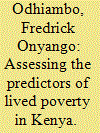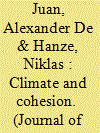| Srl | Item |
| 1 |
ID:
165929


|
|
|
|
|
| Summary/Abstract |
Poverty remains pervasive in Kenya despite efforts to reduce it. This may be attributed to poor understanding of its predictors. Using Afrobarometer Round 7 data and employing multivariate logistic regression, the study found that age, religion and political affiliation were risk factors associated with poverty while education was a protective factor. The study recommends that investing more in all levels of education is key to reducing poverty in Kenya. Further, social protection policies and programmes for the elderly, as well as initiatives to enhance savings for those in the informal economy, are important for poverty reduction.
|
|
|
|
|
|
|
|
|
|
|
|
|
|
|
|
| 2 |
ID:
178652


|
|
|
|
|
| Summary/Abstract |
While a large body of research has highlighted the conflict-inducing effects of climate change, we still know very little about the mechanisms linking environmental conditions to violent conflict. This article investigates the plausibility of a prominent channel according to which scarcity of natural resources can foster violent conflict through deteriorating intergroup relations. In addition to assessing the direct effects of adverse environmental conditions on intra-ethnic and inter-ethnic trust, we suggest a conditional argument on the role of horizontal inequality of hazard exposure. Environmental hazards are ‘unequal’ if they systematically affect ethnic groups differently. While inequality may reinforce intra-ethnic ties and out-group suspicion, equal hazard exposure may create a sense of unity among diverse victims in their collective struggle to cope with harsh environmental conditions. We test these arguments in the context of the severe drought periods that affected most East African countries in the years 2004 and 2005. The empirical analysis combines gridded information on drought severity with geo-located survey data across six countries in the region (Afrobarometer survey 2005/2006). Our main analyses find that exposure to drought hazards correlates positively with self-reported trust within and across ethnic groups. The latter association, however, depends on the degree of intergroup equality of hazard exposure and wanes as inequality increases. Taken together, these findings indicate that if droughts increase the risk of violent conflict, they seem to do so through mechanisms other than intergroup polarization and despite their positive association with ethnic trust. This is most likely the case in contexts where there is pronounced horizontal inequality of drought hazards.
|
|
|
|
|
|
|
|
|
|
|
|
|
|
|
|